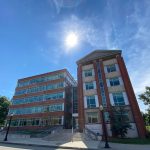Violet Jiménez Sims, associate director of teacher education for School-University Partnership at the University of Connecticut’s Neag School of Education, agrees that this year is certainly different. Over the summer, UConn met with partner districts to map out clinical placements. The first thing they learned: not everyone’s definition of hybrid is the same.
“Some were pivoting from in-person to virtual learning and grappling with how many individuals would be allowed in classrooms,” Sims said.
The Neag School is currently seeking applicants to four faculty positions.
“My friend, David K. Cohen, died on September 23. A prolific scholar of teaching, learning, educational reform, and social policy, David was a renowned writer and beloved teacher and mentor,” says Neag Endowed Professor of Teacher Education Suzanne Wilson. “Many have studied teaching and educational policy. But David’s work was special for reasons that enriched my life and education scholarship.”
“Our number-one goal is to enhance the quality of life of those with developmental disabilities and that of their families,” says early childhood intervention expert Dr. Mary Beth Bruder, the UCEDD’s director and professor of public health sciences and pediatrics at the UConn School of Medicine and Neag School of Education. “A qualified workforce to help accomplish this goal is critical for all of society.”
On September 22, the Duke University Talent Identification Program (Duke TIP) welcomed Dr. Del Siegle, who is a professor in the University of Connecticut’s Neag School of Education and the director of the National Center for Research on Gifted Education (NCRGE), to deliver a presentation entitled “Report from the NCRGE: Problems and Promising Practices in Gifted Education.”
Editor’s Note: The following piece was originally published in UConn Today. In-person, hybrid, remote, and/or home-school – the options for K-12 schooling during the pandemic are complicated, each with their own pros and cons. UConn Today asked psychologist Sandra Chafouleas, Board of Trustees Distinguished Professor and Neag Endowed Professor in the Department of Educational Psychology, […]
“The process of being creative does a whole bunch of really good things for us,” physically and mentally, said James C. Kaufman, professor of educational psychology at the Neag School of Education at the University of Connecticut in Storrs. Kaufman, who has written extensively about creativity, said there are many reasons why a stimulating hobby can help us. The first is pretty simple: It’s fun.
The panel discussion will center on S. 4360: Counseling Not Criminalization in Schools Act. Introduced by Senator Murphy, S. 4360 is a bill to reduce police presence and increase resources for counseling in schools, with aims “to divert Federal funding away from supporting the presence of police in schools and toward evidence-based and trauma informed services that address the needs of marginalized students and improve academic outcomes” in order to “create safe and inclusive schools for all students.
In-person, hybrid, remote, and/or homeschool – the options for K- through-12 schooling during the pandemic are complicated, each with their own pros and cons. UConn Today asked psychologist Sandra Chafouleas, Board of Trustees Distinguished Professor and Neag Endowed Professor in the Department of Educational Psychology and co-director of the UConn Collaboratory on School and Child Health, about the importance of social and emotional health for children and their caregivers, particularly this year.
Kathleen Lynch, a professor at UConn’d Nead School of Education, noted that research on the summer slide — and how it affects different groups of students — remains mixed. “I do think some caution is warranted in making projections about COVID learning losses extrapolating from summer learning loss studies,” she said.


